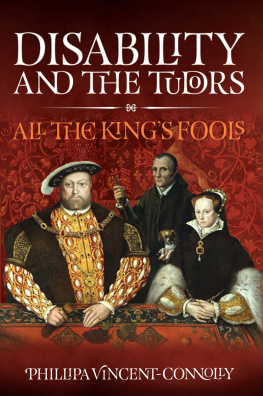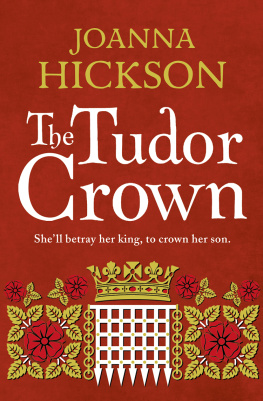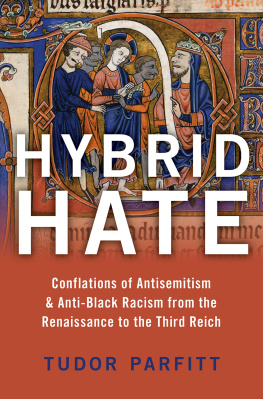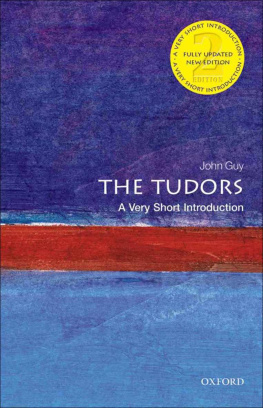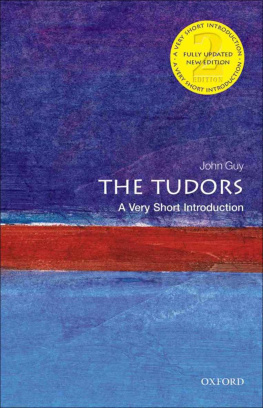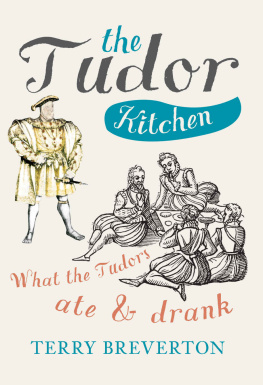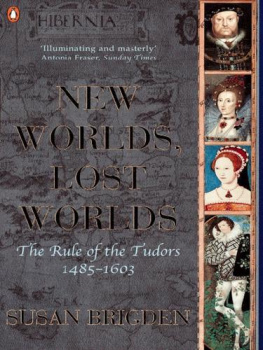More Praise for Black Tudors
The book is based on impeccable research in a rich array of sources. But Dr Kaufmann wears her learning lightly and tells a series of fascinating stories with an elegance and wit that should appeal to many readers.
Dr Clive Holmes, Emeritus Fellow and Lecturer in History,
Lady Margaret Hall, University of Oxford
Miranda Kaufmanns Black Tudors, grounded in extensive and impeccable archival research, presents an evocative and convincing picture of the lives of real men and women of black African descent in Renaissance England. Concentrating on ten strikingly varied individuals from a royal trumpeter to a silk-weaver Kaufmann persuasively argues that Africans who came to England in this era were able to find a meaningful place in English society, not only in London, Southampton and Bristol but also in rural areas. Drawing on parish records, legal cases, letters, visual images and her broad knowledge of Tudor-era economic history and global mercantile expansion, she dispels the myth that the black Britons of this era existed only at the very upper or lower margins of society. Each of her ten individuals, who are cleverly linked to the records of many others, is vividly brought to life through a discussion of their goals, their labour and their vicissitudes, and set within the complex social, political, economic and religious history of the period. The book is a brilliant example of how to use the most detailed kind of archival data to present a broadly accessible picture of the past, and one which has enormous relevance to the present controversies about immigration and diversity.
Paul Kaplan, Professor of Art History,
State University of New York
Who knew that a diver from West Africa worked to salvage Henry VIIIs flagship the Mary Rose? Based on a wealth of original research, Miranda Kaufmanns Black Tudors restores the black presence to sixteenth- and seventeenth-century England in all its lively detail. Africans lived and worked not as slaves but as independent agents, from mariners to silk weavers, women and men, prince and prostitute. Black Tudors challenges assumptions about ethnic identity and racism in Tudor England. It will be required reading for anyone interested in new directions in Tudor history.
Dr John Cooper, Senior Lecturer in History,
University of York, and author of The Queens Agent
BLACK TUDORS
THE UNTOLD STORY
MIRANDA KAUFMANN

For my husband Olivier, my shelter from the storm.
My lover is an olive tree whose roots grow by the sea.
Jeanette Winterson
Contents
Introduction
I N A PRIL 1645 Sir John Wynter burnt his home to the ground rather than see it fall into Parliamentary hands. White Cross Manor, built at the zenith of the Tudor age, had been destroyed by the Civil War that marked the nadir of the following century. The Wynter family featured the sorts of characters that traditionally appear in Tudor history books: Sir William Wynter commanded the Vanguard in the fight against the Spanish Armada and his son, Sir Edward, sailed with Sir Francis Drake. The Reformation unleashed by Henry VIII had forced the family to practise their Catholic faith in secret. But White Cross Manor was also the scene of an unknown episode of Tudor history. For it was there, in the last decade of Elizabeth Is reign, that a Black Tudor, known as Edward Swarthye, alias Negro, whipped an Englishman named John Guye.
Despite the insatiable appetite for all things Tudor, from raunchy television series to bath ducks modelled as Henry VIII and Anne Boleyn, the existence of the Black Tudors is little known. The popular concept, as dramatised in the Opening Ceremony of the London Olympics in 2012, is that people of African origin first arrived in England when the Empire Windrush docked at Tilbury in 1948. Its quite a jolt to consider that there could have been Africans in the crowd gathered at those very same docks when Elizabeth I galvanised her troops to face the Spanish Armada three hundred and sixty years earlier. There were Africans present at the royal courts of Henry VII, Henry VIII, Elizabeth I and James I, and in the households of famous Tudors including Robert Dudley (Earl of Leicester), Sir Walter Ralegh, Sir Francis Drake, William Cecil (Lord Burghley) and his son, Robert; and across England from Hull to Truro. Black Tudors played fascinating roles in the famous stories of the Mary Rose and the Golden Hinde, as well as in a host of other untold stories, like the whipping at White Cross Manor.
Once people learn of the presence of Africans in Tudor England, they often assume their experience was one of enslavement and racial discrimination. This attitude is neatly summarized by the only three entries in the Guardian Black history timeline for the period: 1562: First English slave trade expedition, 1596: Elizabeth I expels Africans and 1604: Shakespeare and Othello. And although much has been written on the question of racism in Shakespeares Othello, we mustnt forget that it was a work of fiction designed to entertain, and so must be set alongside archival evidence of how Africans were treated in Englands churches, households and law courts.
The misconceptions surrounding the status of Black Tudors are part of a wider impression that any African living outside Africa before the mid-nineteenth century, be it in Europe or the Americas, must have been enslaved. When most of us think of a slave, the image that appears in our minds is of an African. There is more than enough visual material to draw upon, from films such as 12 Years a Slave and television series such as Roots, to the exhibits at museums such as the International Slavery Museum in Liverpool and the London, Sugar and Slavery gallery at Museum of London, Docklands.see Africans reduced to one of a series of commodities traded in a triangle, packed into ships in chains. Equal attention is not given to the extensive history of Africa before the Europeans arrived there and to examples of collaboration between Europeans and Africans, or to the free Africans living in Europe.
Not all slaves were African. The word slave itself comes from Slav, referring to the Slavonic peoples of Eastern Europe, who were enslaved in great numbers by the Holy Roman Emperor Otto the Great and his successors from the tenth century onwards.
Contemporary concerns naturally shape the questions we ask about our past. It is difficult for us in the twenty-first century to push aside the nationalist myth of the Tudors created by nineteenth-century imperialists and imagine an England before the emergence of the British Empire. Tudor England was a small, relatively weak kingdom on the edge of Europe, which had not yet experienced the full horrors of the transatlantic slave trade and colonial plantation slavery. These abominations, alongside the imperialism and scientific racism that followed, cast their shadows across almost every discussion of the history of Africans in Britain. Today, immigration and the question of whether institutional racism is endemic to society bedevil political discourse. These issues may be the source of our questions, but they cannot be allowed to shape our conclusions about the past.
The answers are complex, but the questions that most commonly spring to mind about the Black Tudors are simple: why and how did they come to England? How were they treated? What were their lives like?
To understand how and why Africans came to England, we must look to the dramatic developments going on in the wider world. In a century dominated by the Spanish and Portuguese, England was small fry on the global stage. Following Columbuss discovery of the Americas in 1492, the Iberian powers carved up the world between them in the Treaty of Tordesillas in 1494. Spain laid claim to the New World of South America and the Caribbean, while Portugal looked to Africa and the East Indies. Their empires were united from 1580 under the rule of Philip II. Strangely enough, it was the death of the young Portuguese King, Don Sebastian, on
Next page

